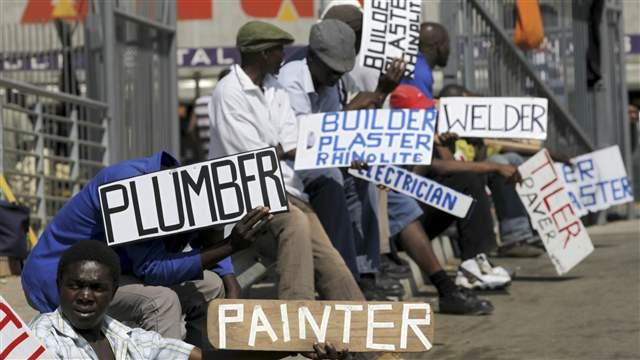Dec. 28 (GIN) –This was the year African economies were poised to rise and invest some of their new-found capital in jobs and infrastructure. But the triple threat of climate change, falling oil prices and ethnic strife has left some heads of state scrambling for alternative ways to fund their ambitious plans.
Of the largest economies, South Africa had a very tough 2015. A slowdown in the Chinese economy took a big bite out of South Africa’s export revenues.
Excess supply and weak demand for minerals sparked talk of shutdowns and layoffs by the largest employers. Anglo American, employing about 45,000 workers, revealed plans to cut 85,000 jobs in South Africa and worldwide. The mining company Lonmin may cut 6,000 jobs.
As far as agriculture, South Africa is reeling from the worst drought in more than three decades. Some parts of the country have been declared disaster areas, thousands of livestock may have to be killed, and the government is spending about 350 million rand ($25 million) on emergency measures.
In Angola, the second largest petroleum producer on the continent, oil drove the nation’s growth for decades. Now, low prices are driving inflation, depreciation and economic crisis.
Nigeria, despite its rosy headlines, huge population and massive potential, may soon have an economy smaller than DR Congo and Ethiopia by 2050,” warns Carlos Lopes, head of the U.N.’s Economic Commission for Africa.
Nigeria produces just 1.5% of the electricity it needs for its 173 million people. Exasperated Nigerians dub the Power Holding Company of Nigeria the “Please Hold Candle Nearby” company. Industries retain slow, outdated manual processes because they don’t have the power to run machines.
Turning to the Democratic Republic of the Congo, its total mineral wealth at a mind-boggling $24 trillion, more than the GDP of Europe and the US combined, thousands of mine workers fear for their future. Production at the Katanga mine has been suspended since September, responding to a six-year low in copper prices.
That leaves Ethiopia. At nearly 100 million, the country posted blistering economic growth in the past decade or so.
More importantly, it is fast closing the infrastructure gap, laying down a flurry of roads, railways and power projects, which would give it a competitive advantage in the region, particularly over DR Congo that is notoriously poorly connected.
But this mega-infrastructure binge has put enormous pressure on Ethiopia’s public finances, analysts fear, which are already strained following the first growth and infrastructure plan that expires this year.
A West and Central Africa Mining Summit takes place in Ghana this May. A more realistic vision for Africa’s resource-based economies might well emerge. w/pix of jobseekers in South Africa






